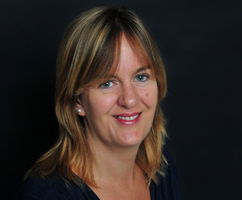Studying? Fifteen things I wish I’d known!
 Today, Ann Prayle and Lois Shimmen are both CIM qualified, experienced London marketers. Ann is a marketing consultant and trainer, whilst Lois is marketing manager at giffgaff. As well as their day jobs, Ann and Lois are Student Ambassadors for CIM’s London region looking out for studying members in the capital. But there was a time when Lois and Ann were in the thick of CIM studies themselves. What were their experiences getting CIM qualifications and what do they wish they’d known at the outset?
Today, Ann Prayle and Lois Shimmen are both CIM qualified, experienced London marketers. Ann is a marketing consultant and trainer, whilst Lois is marketing manager at giffgaff. As well as their day jobs, Ann and Lois are Student Ambassadors for CIM’s London region looking out for studying members in the capital. But there was a time when Lois and Ann were in the thick of CIM studies themselves. What were their experiences getting CIM qualifications and what do they wish they’d known at the outset?
Ann got the full set over six-years
Ann worked her way through CIM qualification levels between 1998 and 2003 with the certificate, advanced certificate (as it was then) and Postgraduate Diploma in Marketing. It was exam-only then, so that’s a total of 12 exams.

“I fell into marketing initially. I had the choice of taking on the role of marketing assistant or taking redundancy! From working in that role, I developed an interest in marketing and CIM was recommended to me. Initially I studied with Westminster College for the Certificate. Then I took the distance learning route for the Advanced Certificate. Finally, for the Diploma, I studied with London Met and Student Support Group. Having started in 1998/9 I finished my CIM studies at the end of 2003. I took some breaks along the way because of job changes and a house move, and since I self-funded all the way I needed time to save up!”
Lois combined Diploma with job-move
Lois studied for the Diploma in Professional Marketing (level 6) through The Marketers Forum in central London, whilst taking on a challenging new job role.

“I chose this course because I’d heard so many great things about the CIM courses. I wanted one that would blend the solid academic theory and years of experience from academics studying the field, with very practical, modern principles that apply to innovative businesses today. During the first module, I was very busy working for a fast-growth start-up. By the second module I was mid job-change, getting my head around the CIM project and settling into an entirely new business. With hindsight, it didn’t make my life easier however it powered an incredibly thorough understanding of the business. I got to know most teams within a month because of the demands of the CIM project. Still today, I benefit from the foundation of knowledge I acquired and relationships that were built in those first weeks.”
Fifteen things I wish I’d known about CIM studies
With two very different study journeys Ann and Lois share what they wished they’d known about studying for CIM qualifications.
- There’s no good time to study so don’t wait
 Ann: “I wish someone told me that there’s never a good time to study as life is always busy. It’s a bit like having children! There’s never a perfect time, financially or career wise. So don’t delay studying – just make a start.”
Ann: “I wish someone told me that there’s never a good time to study as life is always busy. It’s a bit like having children! There’s never a perfect time, financially or career wise. So don’t delay studying – just make a start.”
- It’s a stretch but you can do it
Lois: “Going through the job application process and interviews while completing my first module project and studying for the exam was hard, very hard. Getting the results through for my second module, I discovered I was capable of far greater a stretch than I had realised - new role, new business, exams, handing work in early because I’d got a holiday booked! You’ll be surprised what you can do.”
- The lows make the highs even better
Ann: “Failing the last module of PG Diploma, the case study one, was a low point for me. I got a D and I was devastated. It was like I’d fallen at the final hurdle of the Grand National! But then came the high point, coming out of my retake exam and knowing I’d nailed it that time. Everything fell into place with that case study in the run up to the exam. I had a great working group too and I was much more confident. Considering how disappointed I’d been when I failed it the first time that confidence felt really good.”
- Get organised and ask questions as you go
Lois: “Keep tabs on all the models and frameworks you are learning. Keeping all your notes printed out is really helpful to refer back to quickly later on. As best you can, space out your work to align with the webinar dates and deadlines set by your tutor, because the webinars are a fantastic way to clear up any questions you have as you move through your project. You’ll kick yourself later when the chance to ask questions has passed.”
- It’s easier to study in bite-size chunks
 Ann: “The important thing for me was setting out the work and then the revision into chunks so I knew I had some time to spare and plenty of time to revise. I also awarded myself with treats along the way!”
Ann: “The important thing for me was setting out the work and then the revision into chunks so I knew I had some time to spare and plenty of time to revise. I also awarded myself with treats along the way!”
- Working together builds friendships
Lois “I wish I’d known about the bond and comradeship you form with your other studying peers while you all go through the same stretch – and that it’s far better to help each other and give one another support, share articles and references, than it is to work alone.”
- Decide how to keep yourself motivated
Ann: “I was a pretty motivated self-starter and didn’t struggle to get on with it but I did find it difficult to have patience when things were not working as well as they could and did have the odd desire to give up from time to time. Staying motivated is something I wish I’d been more prepared to tackle.”
- Remember you’re doing better than you think
Lois: “I wish I had known how all-consuming the case study projects would be so that I could have planned my personal life more around the time and sacrifices it would require from me. And I wish someone had told me how similar it is to the final year of university and that you’re actually doing far better than you think most of the time.”
- Be active and prioritise study over non-essentials
Ann: “Be active! Don’t sit back and wait for things to happen and expect it to fall into your lap. It’s down to you and you alone to get it done. Plan, stick to a plan but have some contingencies for life getting in the way a little bit and reward yourself regularly. Prioritise your studies over non-essentials and get someone else to take the rabbit to the vet for a change!”
- It’s your work, so stay in your lane
Lois: “Pace yourself, and stay in your lane. Don’t be overly worried about your project differing from your classmates – learn where you can, but stay in your lane. Three distinctions didn’t come without a few sideways worried glances early in the process!”
- Get the kind of support that suits you

 Ann: “Buy-in from family and friends helped so I didn’t get badgered about doing stuff when they knew I was studying. I did enjoy the study-buddy bit but was also OK on my own. Much depends on the individual and it’s good to know that about yourself before you start!”
Ann: “Buy-in from family and friends helped so I didn’t get badgered about doing stuff when they knew I was studying. I did enjoy the study-buddy bit but was also OK on my own. Much depends on the individual and it’s good to know that about yourself before you start!”
- Give yourself space to see the big picture
Lois: “Get to know your business case study in detail, but then give yourself headspace to stand back, think creatively, play with concepts and models you’ve learnt and look at your project with some big-picture thinking. It will help you keep focused on what is really unique, special, exciting and challenging for your brand and remind you why you are sacrificing – and will help keep you connected to the point of the project.”
- Make marketing theory your own
Ann: “It’s definitely important to get the theory into your own words so you can understand it. It’s also really important to apply everything and anything to your organisation, which really helps you to remember it - and it’s a vital skill for CIM success. I didn’t do any assignments obviously but if you want top tips as a tutor, let me know!”
- As you learn pay it forward
Lois: “As much as you can, pass your learnings on to the team you manage. It’s remarkable how much you pick up and how useful it can be for other people to join your wavelength of thinking so you move forward together. Never underestimate the value of paying it forward. The privilege of studying for a year and finding the space in your life to learn what you have can add great value to others.”
- Visualise yourself qualified
Ann: “Make sure while you’re studying you visualise how good you will feel at the end. Think about what you’ll be able to differently and better. Remember, you’ll have more authority and confidence within your organisation when colleagues know you’re CIM qualified. I thought it would help me but hadn’t appreciated how much. So, don’t underestimate it and visualise how good that will be, as you grapple with your studies.”
![]()
![]() To share your own #CIMstudytips, tweet @CIMinfo_London
To share your own #CIMstudytips, tweet @CIMinfo_London
